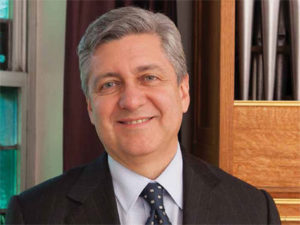
Traditional indigenous communities in the U.S. are sustained by their spiritual relationships with ancestral lands.
Yet vast tracts of Indian land are under the ownership and control of the federal government. When the government regulates its land in ways that impinge on the wellbeing of native peoples, conflicts erupt.
Elmhurst College President S. Alan Ray will explore this subject when he presents Native Sacred Lands and Federal Regulation: How the Doctrine of Discovery Shapes Religious Liberty in Indian Country at Union Theological Seminary in the City of New York.
A scholar of federal Indian law, a citizen of the Cherokee Nation and president of Elmhurst College since 2008, Dr. Ray will speak on Tuesday evening, October 15, at Union Theological Seminary, the oldest independent, non-denominational seminary in the U.S.
President Ray’s talk will examine how the U.S. government came to claim ownership of tribal lands through the use of the so-called Doctrine of Discovery. Conceived in the Middle Ages and deployed in the Age of Exploration, the Doctrine is a little-known but powerful jurisprudential tool of colonization that retains force today in the courts of the United States. More than a legal abstraction, the Doctrine operates on assumptions of race and property that are hostile to Native Americans and tribal nations. It is currently under assault by indigenous peoples around the world, by the UN, and by progressive religious groups. The outcome of these contests may determine the shape of religious liberty in Indian Country for generations to come.
At Elmhurst College, Dr. Ray serves not only as president but also as a professor of religion and society. His scholarly interests include federal Indian law, religion and public life, and Native American studies. In July of 2010, President Barack Obama appointed Dr. Ray to the National Advisory Council on Indian Education.
Union Theological Seminary has been home to numerous legendary teachers and scholars, including Christian theologian Reinhold Niebuhr, who graduated from Elmhurst College in 1910. In 1928, Niebuhr became a professor of the philosophy of religion at Union Theological Seminary, where he taught until his retirement in 1960.